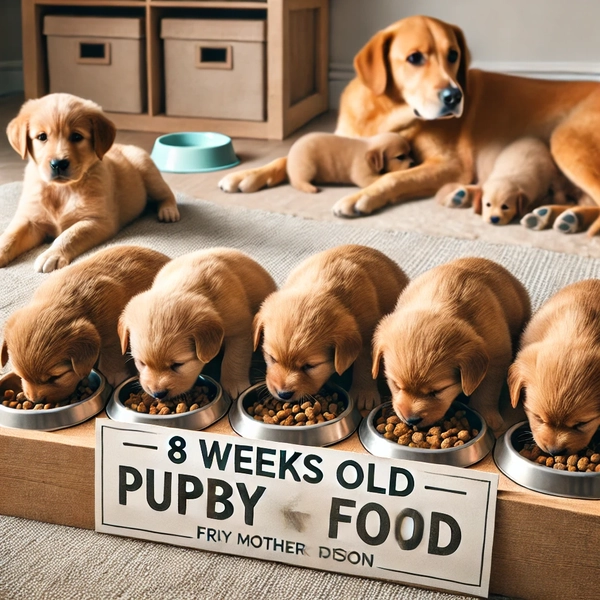How long do puppies drink milk from their mother? Healthy puppies consume their lactating mother’s breast milk for 6 to 12 weeks from birth. This milk becomes their primary dietary intake, providing all the nutrition that allows them to grow correctly.
However, how long do these puppies feed on this milk, and what occurs during this process? Let’s investigate this point in a more simplified manner.
How Long Do Puppies Drink Milk From Their Mother?
The First Few Weeks: Essential Milk Time

In the first 3 weeks of life, all puppies are entirely dependent on sucking their mother’s milk. In this part:
- Colostrum: Immediately after the birth, puppies are given a type of milk called colostrum. It contains substances called antibodies in high concentration that protect the puppies from any disease. This is because these puppies are pretty small and vulnerable.
- Frequent Feeding: Puppies feed often, almost every 2 hours. They, however, stay close to their mother for warmth and reassurance and for her to satisfy their hunger.
This stage is full of bonding and growth. If you have a litter of puppies, watch them and ensure they all ‘take a turn’ at the feeding. One may even need to assist one to get to the mother physically.
Weeks 3-4: Transition Time Begins

Puppies begin to change at approximately 3-4 weeks. They are adventurous and may want to explore and try new things – it is at this time, that their mother’s milk remains their core source of nutrition, but the weaning bit begins. Weaning is the gradual change of diet from milk to solid food. This is what happens:
- Puppies Start Exploring: They may lick some mushy puppy chow. Initially, they may not consume much, but they are practicing their skills!
- Mother Limit’s Feeding: The mother may not be forthcoming in feeding them as much as she used to. This is natural; she is giving them other food options.
Weeks 5-6: Weaning Process in Full Swing

When puppies reach 5-6 weeks, they are deeper into the weaning stage. The mother continues to nurse them. However, the amount and frequency of milk decreases. Let’s look at what happens generally at this age:
- Puppy Food: The puppies begin eating more solid food. Usually, this is a soft, moist puppy formula that is easy on their adolescent stomachs.
- Independence: Puppies begin to go without their mother. They engage in more play and start to eat without her guidance.
- Less Nursing: The mother might only nurse them a couple of times daily. She is training them to eat by themselves.
If this is the stage at which you are helping care for a litter, ensure the food provided is non-stretching and highly nutritious to assist them in their development.
| Age (Weeks) | Feeding Type | Notes |
| 0-3 | Mother’s Milk | Essential for growth and immune system support. |
| 3-4 | Mother’s Milk + Soft Food | Introduction to weaning; puppies start tasting. |
| 5-6 | Mainly Soft Food + Limited Nursing | Mother encourages independence. |
Weeks 7-8: Nearing the End of Nursing

As puppies reach 7-8 weeks, they are almost fully weaned. This is a period where you will observe some of the changes:
- More Solid Food: Puppies should eat mostly solid food now. The food should be adequate to provide all the vitamins and minerals that the stage provides.
- Less Dependence: The mother may only allow nursing for a short time, which indicates that puppies are becoming ready for independence.
- Social Learning: This stage is also essential for puppies because they acquire skills from interacting with the mother or their brothers and sisters, for example, how to sample playing without being rough.
Tip: If you are looking after the puppies, provide them with food related to their age and clean water at all times. This eases their adjustment.
8 Weeks and Beyond Solid Food Only

At around eight weeks old, puppies are already full of their mother’s milk and can eat solid food.
They depend on the food rather than on the mother. This is an essential step before going to their new homes. Even so, they still require a lot of care and attention.
What Should You Feed Them Now?
- High-Quality Puppy Food: Protein, fats, and other nutrients needed for growth.
- Feeding Schedule: Puppies eat 3-4 meals daily, but a more frequent feeding pattern is advisable. Having a feeding schedule instills discipline in them and helps them form a healthy feeding pattern.
| Age (Weeks) | Main Food Type | Notes |
| 6-8 | Transition to Solid Food | Weaning almost complete; focus on solid nutrition. |
| 8+ | Solid Food Only | Fully independent from mother’s milk. |
Why Is Mother’s Milk So Important?

The milk a puppy receives during the first few weeks is not mere food; it contains critical growth factors and antibodies for protection against infection. Absent this milk and adequate substitutes, a puppy’s chances to thrive will be compromised.
Where it is still impossible for a mother dog to suckle her puppies, the second best option is puppy milk.
As the name suggests, a puppy milk replacer is formulated as a substitute for the mother’s milk and contains the necessary grams-to-pound ratios of nutrients. Care must be taken to branded puppy bottles so that puppies cannot stand or sit up while feeding.
When Can You Begin to Wean Puppies?
As a parent who loves their puppy, how long will it take you before you consider allowing your pup to start weaning? In case you are asking this question, here are some indications:
- Puppies Eat Mother’s Food: Puppies are seen smelling and licking their mother’s and sometimes their food.
- Puppies’ Teeth Development: At this age, puppies begin to develop teeth that assist them in eating solid food.
- Diminished Distress in Nursing: The mother dog might be less eager to nurse the puppies.
If you see these signs, it’s time to stop nursing. Begin with puppy food. Puppy mush is a mixture of dry puppy food drenched in warm water to make it soft enough for chewing.
Smooth Transitioning Strategies
- Be Kind: Every puppy learns things at its own pace. Some may take longer than others, and that is perfectly fine. Extend a little kindness and patience to them.
- Have A Feeding Place: Seating them in compact groups makes their meals more stressful than enjoyable. Puppies need food consumption areas that are devoid of such stress.
- Keep Their Records: Check whether they are taking adequate food and gaining weight; if a particular pup’s situation becomes more complicated, you must do more than help them.
What If The Pups Are Abandoned?
There are situations when pups are born, but the mother is unavailable. This may concern you, but even in such situations, you can assist:
- Chemically Composed Liquid Milk: These types are specially made for pups and contain the correct profile of nutrients.
- Nursing: Newborn puppies, especially those under four weeks, should be nursed every two to three hours, even at night. This is a very cumbersome task yet a vital one.
- Keeping Puppies Warm: Keeping puppies warm is crucial. A heated pad or blanket will go a long way.
Socialization and Its Importance During the Weaning Period
In addition to solid food, weaning also introduces puppies to play and socialization with other puppies. Dogs are doting playmates and buddies, so they naturally play and learn from each other. The time given to them as a whole should be at least eight weeks for them to develop well in both emotional and physical aspects.
A greater part of this process deals not just with the consumption of solid food at the puppy stage of the dog but also teaches different aspects of growth. This includes learning to relate and function with or among other dogs and people.
Conclusion
Puppies feed on their mother’s milk for up to about 12 weeks; weaning is usually practiced at about 3-4 weeks. By the end of 12 weeks, the puppies should have been introduced to solid food and ready to face the world. Understanding when and how to assist puppies in weaning will help them become strong, healthy dogs.
Quick Recap: Until What Age Puppies Drink Milk?
- 0-3 weeks: Only mother’s milk (essential chewing in the first 2 days!).
- 3-4 weeks: First stage of weaning; introduced to some solid food.
- 5-6 weeks: More solid food; Milk less intake.
- 7-8 weeks: Almost all or fully puppies are weaned.
- 8+ weeks: Only solids—one step closer to new frontier!
Puppy tending during this phase of their lives is enjoyable and challenging. With a well-thought-out strategy, you can ensure they develop into well-adjusted and healthy individuals.